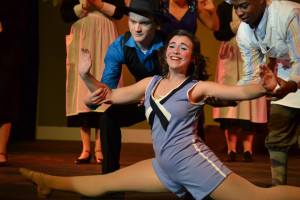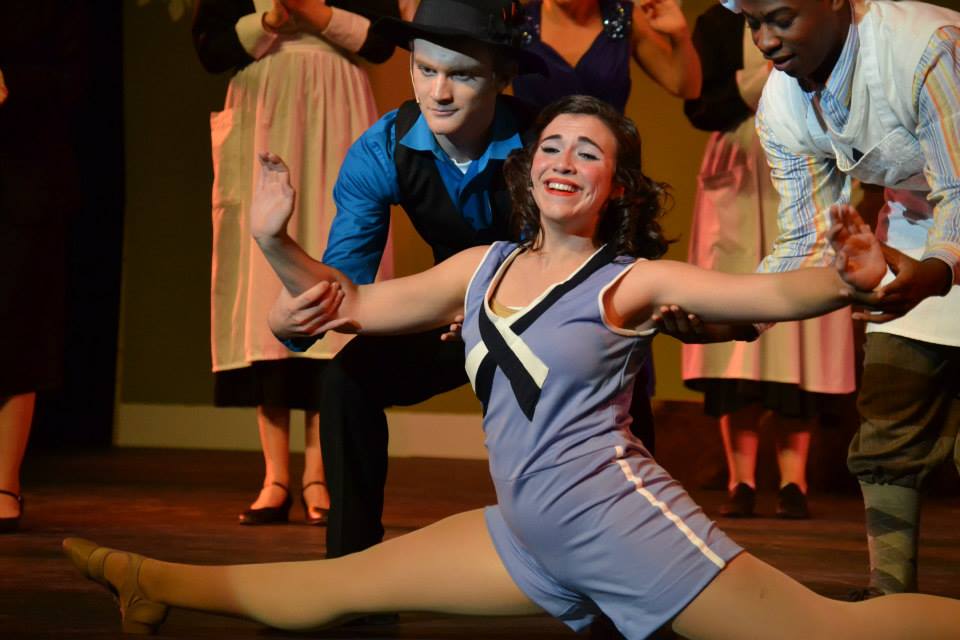
By: Madeline Bauer and Sidney Dills, Contributing Writer and Diversions Editor
“The Drowsy Chaperone,” written by Bob Martin and Don McKellar, with lyrics by Lisa Lambert and Greg Morrison, first came to life on the stage in 1998. The story centers on a fictional musical hit from 1928. Furman’s own Pauper Players, however, have put a fresh twist on what could have seemed like a rerun. The show begins with only the narrator (billed as “Man In Chair”) on stage. An elderly recluse, played wonderfully by Elias Eells, The Man reminisces to the audience about his favorite musical. While his record plays, the play seems to spring to life in his living room. Eells successfully reincarnated the character by truly pretending to be timid and at times, a little regretful of the path that his life has taken him. He, however, is always honest with himself and the meaning behind the play. He reflects on the message of the play and the things the characters are saying, taking them to heart.
Eell’s character starts the play with a monologue in complete darkness, interacting with the audience. After Pauper’s previous musicals, “Rent” and “Les Miserables,” this production’s playful, but surprisingly profound tone came as a real shock. Eells keeps us updated throughout the play of what is going to happen or what to expect and what he says is always how it is. However, the character does a great job of preparing us for the magic in his monologues, rather than spoiling them.
We are quickly introduced to a young couple on their wedding day (Cody Evins and Elizabeth Vellieux), the eponymous Drowsy Chaperone (Caitlin Gilliand) along with several of their wedding guests: a seductive foreigner (Dan Brown), a theatre producer (Matt Turner) and his unintelligent blonde girlfriend (Julie Esworthy), and two gangsters who infiltrate the wedding by pretending to be bakers (Bradwin Amos and Suzy Schmalbeck), among others. Some of these roles seem like nothing more than stereotypes, but that is, after all, the intent of the authors. Vellieux and Gilliand’s singing were by far the best in the entire musical, but they did not have to carry the show alone. Every character played their role in a way that really brought the personality of the characters out.
“Chaperone” is a musical comedy that gets its laughs by emphasizing traditional theater tropes. However, unlike other musicals, the Man In Chair is able to stop the action at any point throughout the show and point these things out. The bride-to-be, Janet, declares that she no longer wants to show off while performing cartwheels, splits and on-stage wardrobe changes. On her wedding day, Janet sings a forlorn love song, but includes the absurd theme of a monkey on a pedestal, backed up by an ensemble of dancing monkeys; thank goodness we were prepared for the ridiculousness of this by the preceding monologue from Man In Chair. The Drowsy Chaperone herself is supposed to keep the bride away from the groom, but, instead, drinks herself to sleep and sings empowering songs about alcoholism. The narrator, who enjoys impressing the audience with his extensive knowledge of musical theater, notes that the original actress who played the part was very much similar, yet still hangs onto her every note. At the end of the play, a character that the audience has all but completely forgotten swoops in (literally) to save the day.
The narrator makes several funny quips about life in general, such as “Sometimes, love is not lovely in the end. Sometimes, in the end, there are lawyers.” However ridiculous it may seem at times, “Drowsy Chaperone” works because it mocks musical theater while simultaneously reminding the audience why they love it in the first place. Many beloved musicals contain these sorts of stage clichés, but the audience knows that it makes them no less valuable. We do not watch musicals because we need a good dose of logical reasoning. Perhaps the Man in Chair says it best. “Musicals take you to another world and give you a tune to carry in your head when you’re feeling blue.”
Pauper Players did a wonderful job putting on this production, and in some ways, it was stronger than “Les Miserables” or “Rent.” It was shorter, sweeter, and just more on point with performance for a level appropriate to the students that were cast. Players could have worked a bit more with the dancing, but the play was so appropriate for a college crowd that it was something hardly noticed. Pauper, doing a play that was in a comedic direction, and was much shorter really helped your performance, do more of that.
